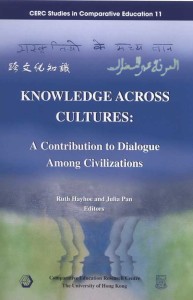Return to CERC Studies in Comparative Education.
 Edited by Ruth Hayhoe & Julia Pan
Edited by Ruth Hayhoe & Julia Pan
2000, 391pp.
ISBN 10: 962-8093-73-8
ISBN 13: 978-962-8093-73-1
HK$250 (local), US$38 (overseas)
Published by Comparative Education Research Centre (CERC)
Preview on Google Books
At the start of the new millennium, the United Nations designated 2001 the ‘Year of Dialogue among Civilizations’. This dialogue emerged after the collapse of the Soviet Union in 1991, and changed much of the field of comparative education. The dialogue draws attention to deep-rooted cultural differences around the world which shape approaches to education.
This book gives voice to outstanding scholars from three major Eastern civilizations – Chinese, Arabic and Indian – who have entered into dialogue with equally distinguished scholars from the West. One of the authors, Abdus Salam, was the first scientist from Pakistan to win the Nobel Prize in Physics. The themes of the book include challenges to knowledge in the late modern era; Eastern contributions to scientific knowledge; knowledge transfer across regions and civilizations; indigenous knowledge and modern education; and past and present influences from China. The book will contribute to an ongoing dialogue among civilizations, and enhance mutual understanding in the increasingly globalized society of the 21st Century.
Ruth Hayhoe is Director of the Hong Kong Institute of Education, and is an Associate Member of the Comparative Education Research Centre of the University of Hong Kong. She is also an Honorary Fellow of the University of London Institute of Education, and Advisory Professor to ten universities in different regions of China. She has devoted two decades to studies of China’s education and Chinese-Western relations in education.
Julia Pan teaches at the Ontario Institute for Studies in Education, University of Toronto. She has recently led two major projects of educational and scientific collaboration between Canadian and Chinese scholars, supported by the Canadian International Development Agency. At the start of the new millennium, the United Nations designated 2001 the ‘Year of Dialogue among Civilizations’. This dialogue emerged after the collapse of the Soviet Union in 1991, and changed much of the field of comparative education. The dialogue draws attention to deep-rooted cultural differences around the world which shape approaches to education.
This book gives voice to outstanding scholars from three major Eastern civilizations – Chinese, Arabic and Indian – who have entered into dialogue with equally distinguished scholars from the West. One of the authors, Abdus Salam, was the first scientist from Pakistan to win the Nobel Prize in Physics. The themes of the book include challenges to knowledge in the late modern era; Eastern contributions to scientific knowledge; knowledge transfer across regions and civilizations; indigenous knowledge and modern education; and past and present influences from China. The book will contribute to an ongoing dialogue among civilizations, and enhance mutual understanding in the increasingly globalized society of the 21st Century.
Ruth Hayhoe is Director of the Hong Kong Institute of Education, and is an Associate Member of the Comparative Education Research Centre of the University of Hong Kong. She is also an Honorary Fellow of the University of London Institute of Education, and Advisory Professor to ten universities in different regions of China. She has devoted two decades to studies of China’s education and Chinese-Western relations in education.
Julia Pan teaches at the Ontario Institute for Studies in Education, University of Toronto. She has recently led two major projects of educational and scientific collaboration between Canadian and Chinese scholars, supported by the Canadian International Development Agency.













